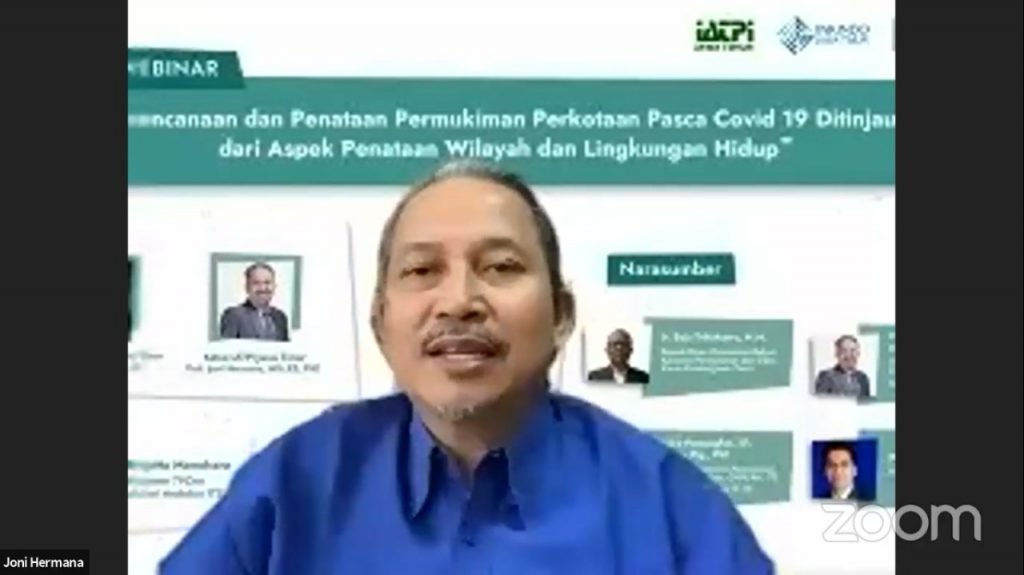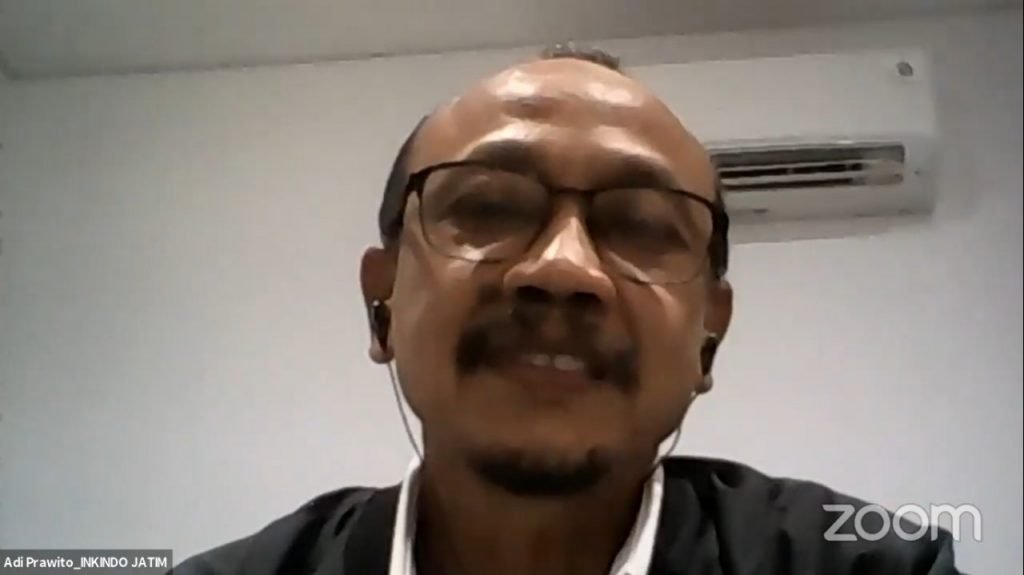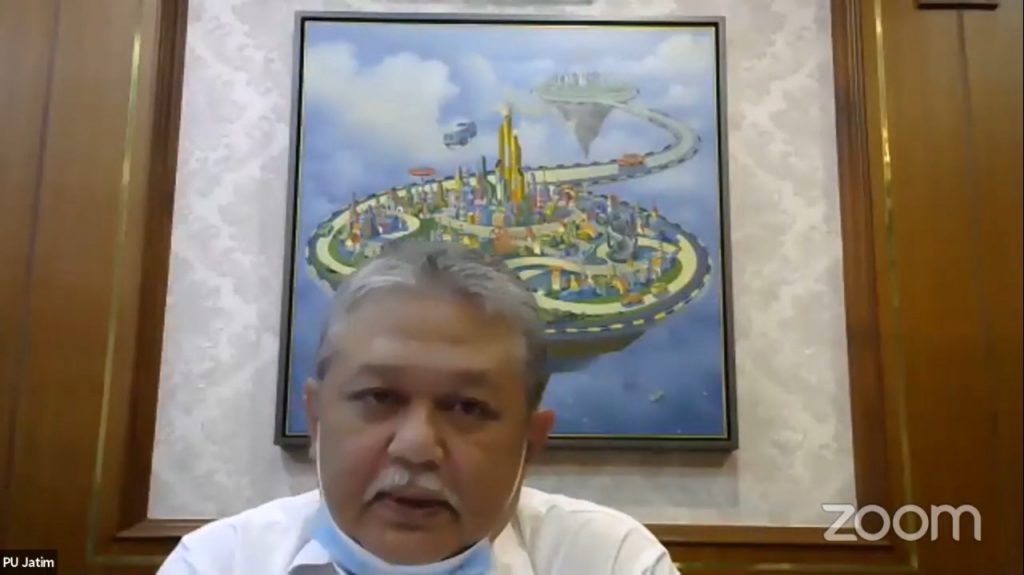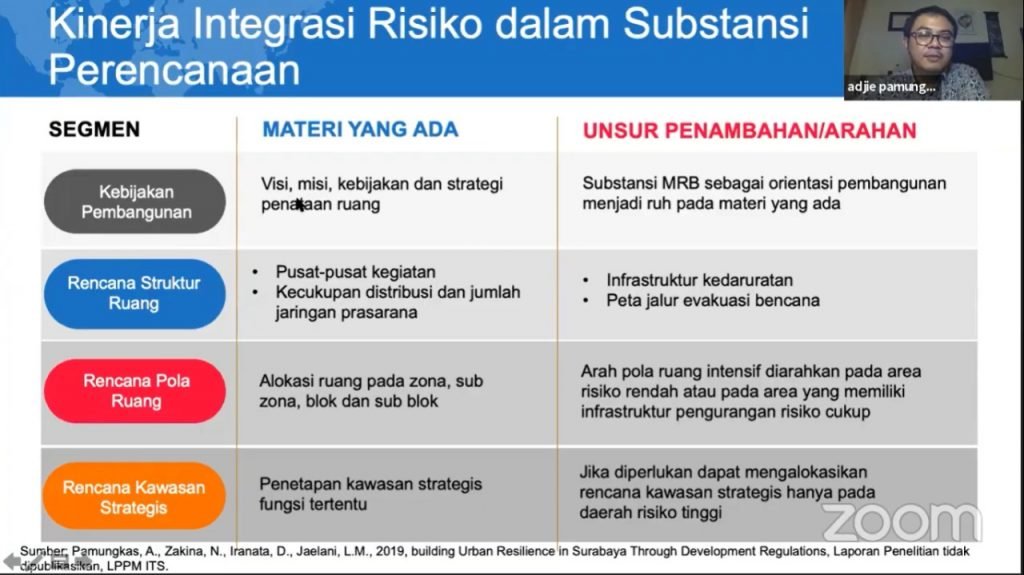Together with IATPI and INKINDO, ITS Discusses Post Covid-19 Urban Arrangement

Prof. Joni Hermana, M.Sc., E.S., Ph.D., when giving an introduction speech as well as being the speaker for the webinar
ITS Campus, ITS News – Covid-19 pandemic has a greater impact on a number of aspects that demands us to take adaptive measures. Realizing this, the Institut Teknologi Sepuluh Nopember (ITS) Department of Environmental Engineering, together with the East Java Indonesian Sanitary and Environmental Engineering Specialist Association (IATPI) and the East Java Indonesian Association of Consultants (INKINDO) held a webinar that was held virtually on Thursday (18/6).
The webinar, with the theme of Post Covid-19 Urban Settlement Planning and Arrangement Based on the Aspects of Regional and Environmental Arrangement, was moderated by Brigitta Manohara who revealed that the arrangement of urban settlement areas was needed because the large Covid-19 case was in urban areas.

The Head of the East Java INKINDO DPP, Ir. Adi Prawito, M.M., M.T., when giving an introduction speech during the webinar
Head of the Department of Public Housing, Settlement Areas, and Copyright of the East Java Province, Ir. Baju Trihaksoro, M.M., explained that the concept of urban planning will definitely change in adaptation to this pandemic. Clean water has become a primary need for the community, given the frequency of each person to wash their hands will be more.
The increased use of water will also increase the quantity of wastewater produced, followed by other wastes such as B3 waste, masks, PPE clothes, tissue, and disinfectants. “Because this B3 waste is dangerous and can come from hospitals, households, and hotels, thus the handling must be strict,” he emphasized.
In line with what was explained earlier, the Head of the ITS Covid-19 Task Force, Adjie Pamungkas, S.T., M.Dev., Plg, Ph.D., revealed that the Covid-19 disaster risk must be integrated into the development plan. For example, in development policies, public health must be the main issue.
In addition, it is also necessary to rethink personal space standards and environmental sanitation standards. “This is also very important because this will be the door for us to make detailed building regulations,” elaborated the Head of ITS Mitigation, Disaster, and Climate Change Center.

Diyan Lesmana, S.T., M.T., also added that due to the existence of this pandemic, redefinition was carried out in the villages of Surabaya, and redefine was carried out. Previously, one RT was considered to be one village, now it has been expanded to become an RW. “This is related to the government’s ability to control the region,” he stated.
Furthermore, each village will implement health protocols. For example, at the entrance of the village gate, a disinfectant will be sprayed on the person who wants to enter. “And also at each entrance will be provided a place to wash hands with soap for people who want to enter,” conveyed this East Java UPN Veteran lecturer.
The Head of the East Java IATPI, Prof. Joni Hermana, M.Sc., E.S., Ph.D., explained that the present situation is not posted Covid-19. Because statistically, this pandemic is not over. “Post Covid-19 means that the curve has decreased, whereas the situation right now, the number is still rising. We are still far from the word post or finished, in fact, we ourselves determine our own health,” he expressed.

Adjie Pamungkas, S.T., M.Dev., Plg, Ph.D., (upper right frame) as Head of the ITS Covid-19 Task Force, when providing an explanation of the integration of risk in planning during the webinar
Joni also revealed that amid the uncertainty of this pandemic, we must be able to remain optimistic, and do our best for our survival. We must also be able to unite and continue to collaborate to find a way out. “Especially now with the 4.0 industrial revolution, we have been able to collaborate easily. This collaboration is very important because the outcome will obviously be greater than working alone,” concluded this former ITS Rector. (ri/ory/ITS Public Relations)
Related News
-
ITS Wins 2024 Project Implementation Award for Commitment to Gender Implementation
ITS Campus, ITS News —Not only technology-oriented, Institut Teknologi Sepuluh Nopember (ITS) also show its commitment to support gender
June 22, 2020 01:06 -
ITS Professor Researched the Role of Human Integration in Sustainable Architecture
ITS Campus, ITS News –The developing era has an impact on many aspects of life, including in the field
June 22, 2020 01:06 -
ITS Sends Off Group for Joint Homecoming to 64 Destination Areas
ITS Campus, ITS News — Approaching Eid al-Fitr, the Sepuluh Nopember Institute of Technology (ITS) is once again facilitating academics who want
June 22, 2020 01:06 -
ITS Expert: IHSG Decline Has Significant Impact on Indonesian Economy
ITS Campus, ITS News — The decline in the Composite Stock Price Index (IHSG) by five percent on March 18,
June 22, 2020 01:06
